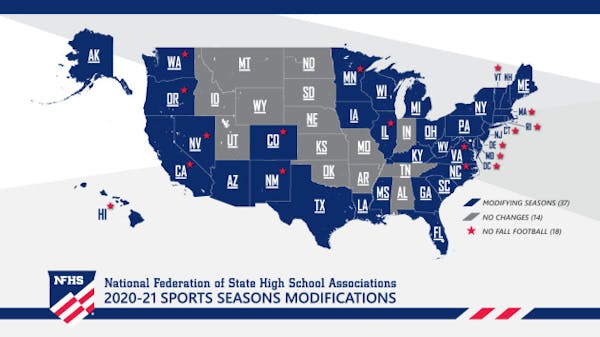Letters informing school leaders of the rising costs to be part of the Minnesota State High School League began arriving this week, hefty bills amounting to increases of as much as 300% that one school administrator called "a kick in the gut."
The league, in the letters, lays out its plan to alleviate a significant funding deficit caused by the COVID-19 pandemic by shifting the burden almost exclusively onto its member schools, many of which have their own budget challenges from the pandemic.
The shift comes as the league has shortened its sports seasons and budgeted for no state tournaments in the 2020-21 school year. Those tournaments have typically funded about 75% of the league's annual budget, which is projected to shrink from $9 million to $5 million this year.
Schools will pay a new "COVID installment'' membership fee that varies by enrollment, with the state's biggest schools paying $11,000 for the school year and the smallest ones paying $1,000. Coupled with other fee changes, their total cost will be at least double the amount paid last year.
At St. Croix Lutheran, a West St. Paul parochial school with an enrollment of 500 students, the increase jumps 300% from $2,760 in 2019-20 to $11,082 this year, which Dr. Todd A. Russ, the school president, called "beyond exorbitant. I feel like this is a kick in the gut."
At Wayzata, with one of the state's largest enrollments at more than 3,000, the new tab for this school year is more than $21,000, also up 300% from about $5,400 last year. Activities director Jaime Sherwood acknowledged the league's needs but added that he "would have liked to see the vision to be ahead of it."
"It's quite a fee," Sherwood said. "My concern is, that's fine when the league is experiencing hardship. But what will it look like when things are rolling along again? Can money be returned to the schools? Or will the league add personnel and activities?"
With the pandemic curbing major gatherings for sports, the league has no plans for traditional state tournaments, instead planning on smaller, still-to-be-determined "culminating events'' for sports.
The league's financial outlook forced it to take action even before the coronavirus pandemic canceled the boys' and girls' basketball state tournaments and the spring sports season.
In February, the board of directors unanimously approved raising each school's annual league membership fee from $120 to $160 for the 2020-21 school year. In addition, the fee that schools pay the league per activity also rose from $120 to $160. And new this school year: Schools are paying $1 per student enrolled, adjusted for free- and reduced-lunch numbers.
How those activity fee increases would potentially be passed down to individual students and families was left for schools to decide.
Then the fallout from the pandemic hit.
After shutting down winter tournaments on March 13, the league, which does not receive direct state or government funding, sought and received a Paycheck Protection Program loan. At its June 1 board meeting, the league said the loan was for $790,000 and that at least $500,000 could be forgiven. In the letter to schools, the league said it "anticipated forgiveness" of the loan.
"The COVID-19 pandemic has had and will continue to have dramatic impacts on the operations and financial situation" of the league, said the Sept. 3 letter signed by board President Blaine Novak and Executive Director Erich Martens.
In July, the league board approved a task force to significantly overhaul what board treasurer Tom Jerome called "an unsustainable and in some ways archaic" approach to funding the organization based on tournaments.
Postponing football to the spring means the league is without its second-highest revenue-producing state tournament. Last year, football netted $889,945. Boys' hockey led the way with $1,133,783 in revenue.
The new enrollment-based fee will generate about $3 million of the league's projected $5 million budget this year, according to documents provided to schools with the letter.
In its letter, the league said it has already taken steps to reduce costs, including reducing its staff from 23.5 to 19.5 positions, freezing staff wages, eliminating or reducing costs of league publications such as tournament programs, and eliminating or reducing costs of league meetings by moving them online.
Russ said he believes the league hasn't explored all potential options for solving its deficit and said he intends to contact the league to "say this is excessive."
"Why not get a loan and stretch these payments out over a longer period of time, like other businesses do?" he asked. "There doesn't appear to be a long-term strategy."
Searching for Snoopy: What happened to all the 'Peanuts' statues in St. Paul?
North Oaks withdraws request for density exemption from Met Council

Fall or spring, it's Rochester Mayo's year in prep tennis

Minneapolis reaches $150k settlement with eyewitness of George Floyd's murder



